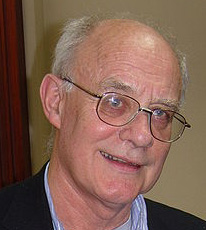CHAIRE ANDRÉ AISENSTADT CHAIR 2010
Une série de conférences / A series of lectures
ANGUS MACINTYRE
Queen Mary University of London
Centre de recherches mathématiques
Pavillon Andre-Aisenstadt, Universite de Montreal
2920, ch. de la Tour
Salle / Room 6214
 |
|---|
| ANGUS MACINTYRE |
Télécharger l'affiche / Download poster
Conférence s'adressant à un large auditoire
Suitable for a general audience
Lundi 18 octobre 2010, 16h00
Monday, October 18, 2010, 4:00 pm
Exponential fields, from the point of view of logic, algebra and analysis
Model-theoretic work, going back to Tarski in the 1930's, has connected logic to the algebra and geometry of the real and complex fields. Tarski posed the problem of extending this connection to the setting of these fields equipped with the classical, analytically defined, exponential functions. Tarski already knew that the complex exponential field is undecidable, a relatively superficial result which inhibited for nearly 70 years any model-theoretic analysis of definitions in that structure. It took 60 years to make a breakthrough on the case of the real exponential, first through Wilkie's 1991 proof of o-minimality, which reveals strong analogies to the case of semi-algebraic sets, and then by the 1992 work of Macintyre and Wilkie revealing the profound involvement of Schanuel's Conjecture in the decidability of the real exponential. As is typical in model theory, progress on specific classical structures is often made by the study of more general structures ("nonstandard models"). In this case, these are the exponential fields, which will be the subject of the four lectures. One nonstandard model with be carefully explained, and an account will be given of the basic algebraic facts concerning exponential fields. In preparation for the subsequent lectures, I will touch on the search for exponential analogues of the notion of being algebraic. I will conclude by an introduction to Zilber's work which revitalized the study of the classical complex exponential.
Une réception suivra la conférence au Salon Maurice-L'abbé, Pavillon André-Aisenstadt (Salle 6245).
There will be a reception after the lecture in Salon Maurice-L'abbé, Pavillon André-Aisenstadt (Room 6245).
Mardi 19 octobre 2010, 16h00
Tuesday, October 19, 2010, 4:00 pm
Schanuel's conjecture, and exponential algebraicity
In this lecture I give a precise account of the notion of exponential algebraicity, and the role of Schanuel's Conjecture in getting a good theory of exponential dimension. I will sketch Zilber's unconditional construction of fields satisfying Schanuel's Conjecture. Finally I will explain the use of Schanuel's Conjecture in the 1992 work on decidability of the real exponential. If time permits I may give some elliptic analogues of this result.
Jeudi 21 octobre 2010, 16h00 /
Thursday, October 21, 2010, 4:00 pm
Zilber's exponential fields as exponential analogues of the complex field
I will describe Zilber's construction of "existentially closed " exponential fields, and his identification of very natural axioms for such fields. The work reveals the amazing possibility that these axioms hold for the complex exponential. I sketch what is known, and describe some of the natural questions about which we know nothing, particularly about the connection between Zilber's field and models of the theory of the real exponential.
Vendredi 22 octobre 2010, 14h30
Friday, October 22, 2010, 2:30pm
Ritt's factorization theorem, Schanuel Nullstellensatz, and Shapiro's conjecture
It has become clear lately that there is a deep connection between Ritt's Factorization Theorem for classical exponential polynomials (from the 1920's), and definability questions arising in the model theory . I will explain these ,and describe known connections between Zilber's fields and the complex exponential fields. This involves results typically proved by analytic methods for the complex field,and by algebraic methods for Zilber's field, a striking example involving exponential functions with no zeros (Schanuel Nullstellenatz, which I will explain).I will conclude by discussing logical insights on Shapiro's 50 year old Conjecture on pairs of exponential polynomials with infinitely many common zeros.